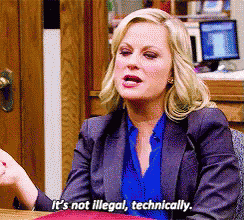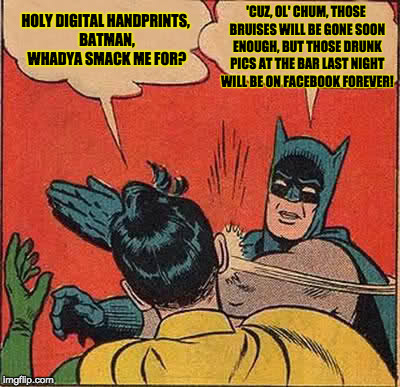Teachers and Social Media
Pole dancing.
That is, dancing, on a pole.
Let us be clear here. Ms. Mason is a teacher and a mother, not a stripper - because I know that is the first thing to come to mind when you hear "pole dancing". It is her hobby. Something she does for fitness, and even teaches part time, for fitness. Again, she is not a stripper. And, what she did was not illegal.
Not illegal, but...
 |
| Image property of and downloaded from Business Day. |
Was posting this video the best choice she could make? Her district handbook states that "teachers are held to the same standard online as they are in public", but those standards are not explicitly defined. This begs the question as to whether school districts, or any employer, has the right to define and punish an employee for something that may be off-color by certain societal and/or moral standards, but isn't illegal. I mean, look at the expectations policies of professional athletes imposed on them by their governing bodies, i.e., Colin Kaepernick and the NFL, athletes taking a knee during the National Anthem, etc. These acts are not illegal, as much as they may offend some. I personally see these acts as one's right to freedom of speech and expression, but I am not in a position of authority... I certainly am not going to judge.
Pole dancing is not illegal. Posting a video of yourself pole dancing is not illegal. Stripping is not illegal as long as its in a proper venue. But moral authorities find it taboo, and unfortunately taboo things, especially in education, tend to get teachers in trouble when they post things to the world on social media.
Again, not illegal, but...
 |
| Image property of Fox Television. Meme downloaded from Mashable. |
Which leads me to my point. As social media has evolved so has my experience with it in the school environment. In my personal life I resist it. I don't have a Facebook account. Go ahead and search for me - you won't find me. The few social media outlets I do have accounts with are for strictly professional reasons, and I have only gathered them over time as I have needed to for professional reasons. I have a professional Twitter handle, a professional LinkedIn profile, and I have used a YouTube channel when I was teaching Animation/Video at Forest Park Middle School to showcase student-made projects. But I don't have Facebook or Instagram, mostly because I don't want kids to find me or to have anything about my life misinterpreted and violate some code of ethics from an employer.
This unfortunately has made communication with friends today difficult, because most of my friends from childhood, high school or college communicate solely through Facebook. My immediate family communicates more through Facebook than with phone calls or even texts! But, again, I don't want underage kids to find me. Even through my professional outlets, former students who are still underage have tried to "connect" with me. I once had to tell a former student, and a really nice kid, that I appreciated the gesture but connecting online would have to wait until they graduated high school. I do connect with current and former COLLEGE students on LinkedIn, sometimes as a project in my computer science classes at Triton College, and sometimes to offer references for their potential employers. But these folks are adults, which is okay.
But students and employers obviously can see ANYTHING that ANYONE puts on social media. I have administrators and colleagues that follow me on Twitter. My current district actively encourages tweeting out about accomplishments in the classroom, but when we do so we have to be careful about making sure students are not on the "no-photo" list. When I take pics, I try to do it in a group setting when kids aren't looking directly at the camera, or of computer screens with a student's back to me so they are not identified, because whether or not a student's image is put online really is the responsibility of the parent to decide when its okay for their child to participate in social media. The law says a child has to be 13 with parental consent - see my blog post about why 13 is the lucky number - but if students that age and younger have access to ANYTHING that ANYONE posts, was it the best decision for Ms. Mason to post videos of her pole dancing?
Again, not illegal, but...
 |
| Video property of NBC/Universal and downloaded from Tenor. |
Use of social media has evolved, and encouragement within the educational community has also evolved. When I first entered education in 2007, I worked as an aide at Willowbrook High School. Rumor had it that the previous year a female teacher, young and just out of college, was fired because of photos she posted on MySpace (remember MySpace, kids?) allegedly depicting her getting drunk with friends. Was this illegal? No. Was this her PERSONAL account? Yes. Was this intended to be viewed by professional peers and administrators? No, but... her superiors supposedly did see it, and thought it didn't reflect the message a teacher should send to high school students and/or peers, so she was let go mid-school year. Not even denied being rehired at the end of the current school year - on the spot! Supposedly. This was over a decade ago, when social media was just "getting started", but apparently that mentality has not changed, as we can see in Ms. Mason's case.
Again, not illegal, but...
At my aforementioned Forest Park, where I worked for 8 years, certain social media use was not frowned upon directly, but it was not necessarily encouraged. When I first started I was not allowed to have a YouTube channel under the then principal for fear that student identities would be available online. YouTube videos can be set to "private" or "viewable by link only and not searchable", but it was still too new at the time for it to be considered mainstream, so I was told no. A few years later under a new principal it was allowed as long as I took all proper precautions (no-photo list, not searchable, etc.) At this point maybe a few coaches had Twitter handles specific to a sports team for kids and parents to follow for weather updates, schedule changes, practices, etc., but no real use by classroom teachers.
When I moved to Brook Forest a couple years ago, tweets and Facebook posts were expected, but at the school level and not the individual teacher level. Myself along with another colleague were put in charge of tweeting for the school, but all tweets had to be reviewed by the principal and the social media secretary in the district office before being allowed to be sent out. Teachers had to fill out a form and submit photos, or request that we come in to take photos during an activity so that we could write a rough draft for review before being tweeted. Since I left teachers there are now tweeting on their own on a regular basis.
At my current school myself and other teachers actively tweet out student accomplishments. This is seen as a form of parent communication. I try to tweet at least once a week if at all possible. I even have not only my professional handle but one specifically for student council, which I am a co-sponsor. This activity is encouraged, and we are followed by parents, colleagues in and out of the district, and administrators. See my social media manual for ideas how to use social media for teachers.
 |
| Meme downloaded from Quick Meme. |
Which leads me back to Ms. Mason. Parents, colleagues and administrators follow her, too. She did nothing wrong, but unfortunately not everyone has the same moral compass. Charles Barkley used to say that he wasn't a role model... but when you are someone a community FOLLOWS, celebrity or not, your example is looked to, and those perceived as bad are frowned upon, and even punished publicly. I don't necessarily discourage anyone in their personal lives to do whatever makes them happy as long as it doesn't directly hurt anyone else, but sometimes depending on your profession, like being an educator, you have to be more careful. Was posting a pole dancing video a good choice? I'm not going to judge, but unfortunately Ms. Mason was.
Not illegal, but...


Comments
Post a Comment